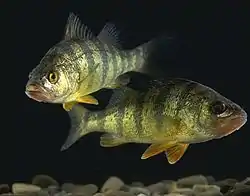окунь
Old Ruthenian

о́кунь
Alternative forms
- о́кꙋнь (ókunʹ) — alternative spelling
Etymology
Inherited from Old East Slavic о́кунь (ókunĭ), from Proto-Slavic *òkunь.[1][2][3] Cognate with Russian о́кунь (ókunʹ), Old Polish okoń, okuń, Old Czech okún.
Descendants
References
- Trubachyov, O., Zhuravlyov, A. F., editors (2005), “*okunъ/ь”, in Этимологический словарь славянских языков [Etymological dictionary of Slavic languages] (in Russian), numbers 32 (*obžьnъ – *orzbotati), Moscow: Nauka, →ISBN, page 43
- Melnychuk, O. S., editor (2003), “о́кунь”, in Етимологічний словник української мови [Etymological Dictionary of the Ukrainian Language] (in Ukrainian), volumes 4 (Н – П), Kyiv: Naukova Dumka, →ISBN, page 177
- The template Template:R:be:ESBM does not use the parameter(s):
url=akun
Please see Module:checkparams for help with this warning.Martynaŭ, V. U., editor (1978), “аку́нь”, in Этымалагічны слоўнік беларускай мовы [Etymological Dictionary of the Belarusian Language] (in Belarusian), volumes 1 (А – бячэ́йка), Minsk: Navuka i technika, page 104
Further reading
- The template Template:R:zle-obe:HSBM does not use the parameter(s):
url=okun
Please see Module:checkparams for help with this warning.Bulyka, A. M., editor (2002), “окунь”, in Гістарычны слоўнік беларускай мовы [Historical Dictionary of the Belarusian Language] (in Belarusian), numbers 22 (оддыханье – ость), Minsk: Belaruskaia navuka, →ISBN, page 181 - Tymchenko, E. K. (2003) “окунь”, in Nimchuk, V. V., editor, Матеріали до словника писемної та книжної української мови XV–XVIII ст. [Materials for the Dictionary of the Written and Book Ukrainian Language of 15ᵗʰ–18ᵗʰ cc.] (in Ukrainian), volumes 2 (О – Я), Kyiv, New York: National Academy of Sciences of Ukraine, Ukrainian Academy of Arts and Sciences in the U.S., →ISBN, page 41
Russian

окунь
Etymology
Inherited from Old East Slavic о́кунь (ókunĭ), from Proto-Slavic *òkunь.
Pronunciation
- IPA(key): [ˈokʊnʲ]
окунь (file)
Declension
Related terms
- окунёвый (okunjóvyj)
Ukrainian
Etymology
Inherited from Old Ruthenian о́кунь (ókunʹ), from Old East Slavic о́кунь (ókunĭ), from Proto-Slavic *òkunь. Cognate with Polish okoń, Belarusian акунь (akunʹ), Czech okoun, Slovak okún, Bulgarian окун (okun), Serbo-Croatian окун.[1]
Pronunciation
- IPA(key): [ˈɔkʊnʲ]
Audio (file)
Noun
о́кунь • (ókunʹ) m animal (genitive о́куня, nominative plural о́куні, genitive plural о́кунів)
Declension
Declension of о́кунь (animal soft masc-form accent-a)
| singular | plural | |
|---|---|---|
| nominative | о́кунь ókunʹ |
о́куні ókuni |
| genitive | о́куня ókunja |
о́кунів ókuniv |
| dative | о́куневі, о́куню ókunevi, ókunju |
о́куням ókunjam |
| accusative | о́куня ókunja |
о́куні, о́кунів ókuni, ókuniv |
| instrumental | о́кунем ókunem |
о́кунями ókunjamy |
| locative | о́куневі, о́куню, о́куні ókunevi, ókunju, ókuni |
о́кунях ókunjax |
| vocative | о́куню ókunju |
о́куні ókuni |
References
- Melnychuk, O. S., editor (1982–2012), “окунь”, in Етимологічний словник української мови [Etymological Dictionary of the Ukrainian Language] (in Ukrainian), Kyiv: Naukova Dumka
Further reading
- Bilodid, I. K., editor (1970–1980), “окунь”, in Словник української мови: в 11 т. [Dictionary of the Ukrainian Language: in 11 vols] (in Ukrainian), Kyiv: Naukova Dumka
- A. Rysin, V. Starko, Yu. Marchenko, O. Telemko, et al. (compilers, 2007–2022), “окунь”, in Russian-Ukrainian Dictionaries
- A. Rysin, V. Starko, et al. (compilers, 2011–2020), “окунь”, in English-Ukrainian Dictionaries
- “окунь”, in Горох – Словозміна [Horokh – Inflection] (in Ukrainian)
- “окунь”, in Kyiv Dictionary (in English)
- “окунь”, in Словник.ua [Slovnyk.ua] (in Ukrainian)
- Yuliya Kutsokon, Yuriy Kvach (2012 September) “Українські назви міног і риб фауни України для наукового вжитку [Ukrainian names of lampreys and fishes of the fauna of Ukraine]”, in Studia Biologica, volume 6, number 2, Ivan Franko National University of Lviv, , →ISSN, pages 199-220
This article is issued from Wiktionary. The text is licensed under Creative Commons - Attribution - Sharealike. Additional terms may apply for the media files.